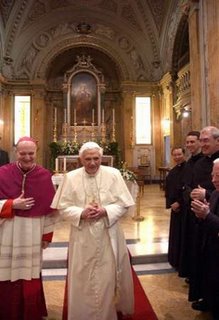If you know me, you know that I am a faithful Protestant Christian. If you have known me for more than a few years, you may also know that I have gotten a lot more "catholic" (and I don't necessarily mean "Roman Catholic" when I use that word) in the last 5-ish years.
One of the reasons I left the congregational/free churches I had been involved with and headed back to liberal and stuffy old Methodism (in which I was raised) was the realization I had that, as an individual, I did not have the authority to interpret Scripture, and I wanted - even required - an organized Church with at least SOME established
Doctrinal Standards or rules for interpretation.
I also realized very quickly, that it would have to be a Church whose doctrines and practice were in continuity with and rooted in the Universal Church through the ages and therefore acknowledged the great Orthodox and
Ecumenical Creeds: The Apostles' Creed and the Nicene Creed, on which all 3 major branches (and most of the minor branches) of Christianity are pretty much agreed.
The crisis came when I realized that I, who believed in the infallibility of the Scriptures as the written Word of God, interpreted them to mean different things (on fairly important points) than other very sincere Christians who also believed in their authority just as I did.How could such a disagreement about the meaning of the Scriptures - that ultimately reflected a disagreement about the character of God - be arbitrated? If the individual is the final authority, then my own authority was equal to those with whom I disagreed, and we have reached an impasse (and this is the point when the smaller group generally starts a new denomination).
I could appeal to the Holy Spirit's having guided my interpretation; but then so did they. Those Episcopal bishops who voted to consecrate a practicing homosexual as bishop in God's Church appealed to the guidance of the Holy Spirit (and indeed, even a selective reading of the Scripture) as the authority behind their position, yet most Protestants disagree with them based on the same criteria.
You see the problem? Some things (like the content of
John 3:16) are abundantly clear from Scripture, but what about those things that are not? Or, how can we decide the best way to bring Scriptural truths to a world that is in many ways very different than the 1st Century Roman World, though exactly the same in its desperate need for those truths.
I remember reading a story in a book called
Evangelicals on the Canterbury Trail of a young man, who said he was tired of hearing 19 year old math majors in his college Bible study talk about what the book of Galatians meant 'to them,' but he wanted to hear from someone who had real authority. That story resonated with me, though I still think it VERY important for 19 year old math majors to read the book of Galatians and ask what it means for them (and then to live that).
I suppose Postmodernity can be content with going around and voicing what the Bible means "for me." But once you start trying to live together in a covenant community, making decisions that will affect more than "just me," then you need to know what it means for everyone.
Anyways, I got to thinking about this because of a post I just read at a Catholic (or Anglican?) blog called
Pontifications (the discussion along these lines that they link to is very interesting). Though I think I am precisely one of those people they are disagreeing with, they got me thinking about this (and comment #4 at the end is challenging/insightful).
I certainly do NOT think that the pope is the one authority who should interpret Scripture for us all - that seems to me quite crazy. But, I must disagree with Luther here, I also do NOT think that my own conscience is a sufficient authority to do so either. The "just me and my Bible" approach has brought us unprecedented division as well as a number of cults that "spun out of" the Christian Church, though it fits well with the hyper-individualism of our day.
I am still trying to sort out a solution; but I think it must probably involve the "orthodox consensus" of what has been believed by most Christians through the ages, and probably also the 7 truly Ecumenical councils (including those canonical Creeds) that are recognized by all Roman Catholics, most Eastern Orthodox, and some Protestants. The model of binding Ecumenical councils that are led by the Spirit is given in Acts 15.
A solution (if we find one) will likely involve some idea of Apostolic succession or Apostolic continuity of doctrine, though certainly not the "bishop-to-bishop" model put forth by some of the "Apostolic Succession churches", since it has demonstrably failed at times.
But if you stop and think about it, before there was a Roman papacy, and before there was even a New Testament Canon, there was an Apostolic Tradition that had authority for the Church (
1 Cor. 11:2); and it seems to me that both the New Testament and the "Apostolic Succession of Bishops" were intended to inshrine that Apostolic teaching and make it available to later generations.
Labels: Ecclesiology, Evangelicalism, Paleo-Orthodoxy, Theology and Ministry












